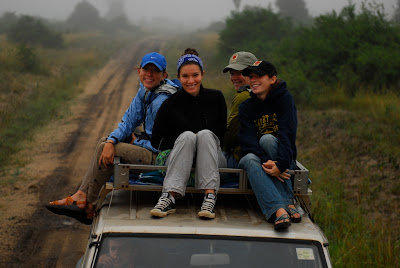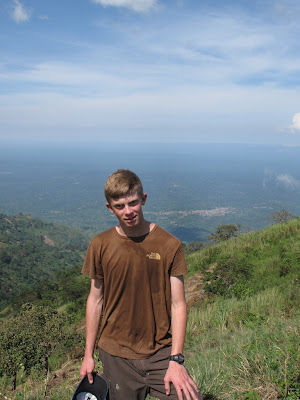After the service about two hundred of us walked on a small path to the neighboring compound of Julius' father, a neat cement house perched on the hillside. There three huge tents draped with festive blue and white chiffon were waiting, an enormous Bible-shaped cake, a sound system, and various choirs. We feasted on hot sweet ripe matoke and flavorful beans, peculiar tidbits of chicken, crunchy cabbage, cow parts unknown (Julia recognized braided intestines in her take). Baby Rock made an appearance for cake-cutting and gifts. Scott gave a short speech, and Julius read Psalm 116:
What shall I render to the LORD for all His benefits toward me?
I will take up the cup of salvation,
And call upon the name of the LORD
Now in the presence of all His people.
We stood in silence to remember the health workers who died in ebola. And it struck me that without that epidemic, we would not have been there. Julius' character would not have shone. We would not have come to know him. Dr. Jonah would not have died, and dozens of generous supporters would not have given the funds which now pay for Julius' medical school. Perhaps he would not have married the spunky and competent nurse Alice, and had baby Rock. We sat with another of our three med students, Ammon, who also would not have gone back to school. There is no adding up in God's economy, no visible balance to prove it was all worth it. We still grieve Jonah. We still remember those days with a pit of sorrow and regret.
But Psalm 116 goes on to say:
Precious in the sight of the LORD
Is the death of His saints.
When the magi brought their gifts and homage, innocent children died, in droves. The Kingdom comes, in blood. Two years out from ebola, we do not yet see clearly all that God was doing. But we acknowledge that the losses are being slowly, surely redeemed. After the party we took a long evening walk, touring the village and the COU hospital with Julius, Ammon, and delightfully a nursing student named Julian who used to be in my Christ School cell group. Kagondo is the kind of place I feel at home: crowded wards, TB and leprosy and AIDS, swarms of relatives, white-capped nurses, a monument of making-do with little to serve many. And decades ahead of our situation in Bundi: xray, oxygen, power, large lab, chapel, a dairy to make their own nutritious feeds, 8 doctors, full surgical services, space. So to walk around the grounds with three young people, to watch them catching vision, to dream of what could be . . . this gives us great hope.
Like the Magi, we brought gifts to a baby, but left with the deeply satisfying glimpse of God coming concretely into real lives, and making new that which is broken.

























